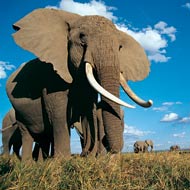Government announces plans to ban ivory sales

The government is planning exemptions for items which do not contribute to the poaching of elephants.
The government has set out plans to implement a ban on ivory sales to help bring an end to elephant poaching.
The proposals aim to protect elephants and help combat poaching by removing criminals to trade illegally-poached ivory. The plans will be subject to a 12-week consultation and cover items of all ages, not just those created after a set date.
“The decline in the elephant population fuelled by poaching for ivory shames our generation. The need for radical and robust action to protect one of the world’s most iconic and treasured species is beyond dispute,” said environment secretary Michael Gove.
“Ivory should never be seen as a commodity for financial gain or a status symbol – so we want to ban its sale. These plans will put the UK front and centre of global efforts to end the insidious trade in ivory.”
Stop Ivory’s chief executive John Stephenson welcomed the plans, adding that the crisis will only end when people stop buying ivory.
“Along with our partners, we congratulate the government on this important step and look forward to working with it and our colleagues to ensure the ban is implemented robustly and without delay,” he said.
Similar to the approach taken by other countries, the government states that it is planning exemptions 'for items which do not contribute to the poaching of elephants and where a ban could be unwarranted'. These include musical instruments, items containing only a small proportion of ivory, items of historic interest and sales to and between museums.
During the consultation period, the government will work with conservationists, art experts and antique dealers on exactly how these exemptions can be defined, implemented and enforced.
At present, ivory produced after 3 March 1947 can be sold with a certificate, with no restrictions at all on ivory produced before that date. The trade of raw ivory at any stage is already prohibited.



 The veterinary mental health charity Vetlife is inviting the veterinary community to join it for a sponsored cold-water dip.
The veterinary mental health charity Vetlife is inviting the veterinary community to join it for a sponsored cold-water dip.